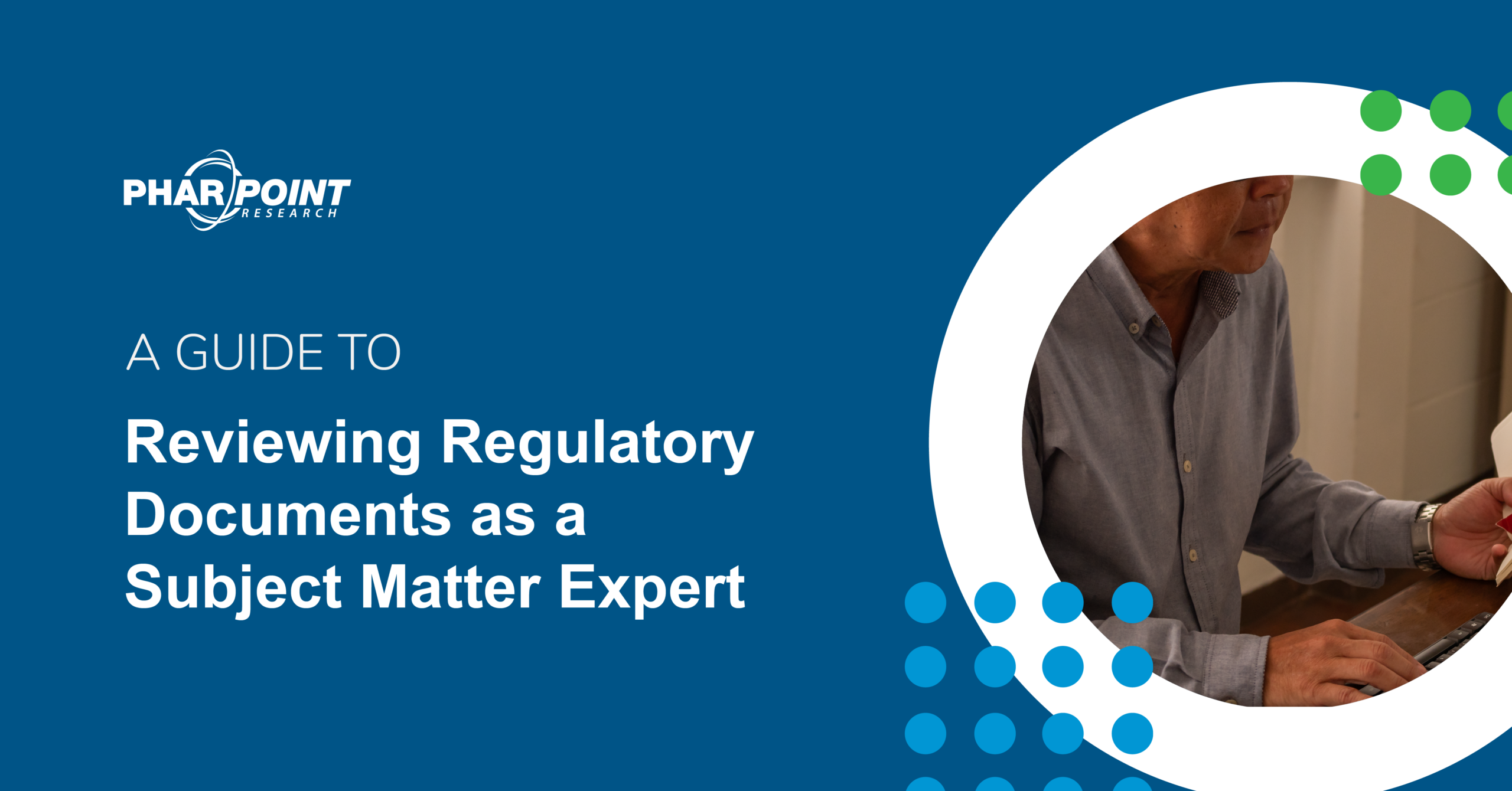An SMEs Role in Document Review
As an SME, you play a unique role in the review process, distinct from quality control (QC). While QC ensures a document is error-free, a reviewer provides insight from a strategic and functional perspective.
Rather than feeling pressured to review a robust document as a whole, protect your time and contributions by focusing on the sections that relate to your area of expertise.
You are in the best position to provide valuable insights into the accuracy and relevance of the content within your function, and that is where your review can truly make the biggest impact.
Narrowing in on Your Focus
When you are wearing your reviewer hat as an SME, it is crucial to understand where to focus your attention. Each SME brings their own expertise to the table and should focus within that specific area so as to not get overwhelmed and overburdened in the review process.
Before we talk about each reviewer’s role, let us talk about the role of the medical writer.
The medical writer focuses on ensuring the document is clear, coherent, and free from errors. This includes checking the overall structure, grammar, and language use. Quality control plays a key part here, ensuring the document follows established writing style guides and standards.
Medical writers also should be playing the role of project manager for study document development and review. This includes helping keep all parties on track, mediating any conflicting comments, and taking ownership of a complete, high quality final deliverable.
A general overview of SME roles during document review can be summarized as follows:
- Clinical Study Manager: As the clinical study manager, your review is focused on the overall study design and operational considerations when implementing the study protocol. Ensure the feasibility of the operational aspects of the document you are reviewing.
- Pharmacodynamic (PD) and Pharmacokinetic (PK) Experts: As the clinical or nonclinical PD/PK expert, you will ensure that all PD/PK input in a document provide the accurate and up to date PD/PK characterization. This includes details on drug-drug interactions, dosages, and safety data.
- Chemistry, Manufacturing, and Controls (CMC): As the CMC expert, the focus of your review would be on the accuracy of reported data pertaining to active pharmaceutical ingredient (API) and the finished drug product.
- Biostatistician: As a statistician, your review is focused on the validity of the data, including statistical methodologies, analyses, and results included in the document. You should confirm that conclusions based on the statistical output are sound and well-supported.
- Clinical Experts: As a clinical expert, your primary focus is ensuring all clinical content is complete and accurate. This includes verifying that the clinical context (including the impact of PD/PK characteristics of an investigational product) makes sense and that the document accurately portrays the clinical risk-benefit analysis.
- Regulatory Affairs: Your focus as a regulatory expert is to ensure that the document is following the applicable regulatory requirements and guidance. During your review, you should ensure that all required documentation and context is included and answers all the regulator’s questions.
- Executive Reviewers: If you are reviewing as a high-level Sponsor contact, your focus should be on the overall messaging and how it aligns with your company’s goals. Additionally, your input may be needed when other SMEs are not aligned on messaging.
Advice for Reviewers
While all insight you provide is valued, you should not be responsible for areas of a document that are outside of your expertise.
The below three pieces of advice can be used to ensure you are putting your review efforts into areas that matter most – and trusting fellow reviewers and teammates to do the same.
1) Ensure clarity surrounding the current stage of the document and what kind of review is expected of you.
To facilitate the review process, medical writers often implement staged reviews. A SME could be involved in multiple different stages (e.g., shell, first draft, second draft, and when the document is being finalized).
The goal at each stage is often slightly different, and documents at different stages may or may not have gone through a comprehensive quality control process. Understanding exactly what the medical writer is looking to obtain from you based on the current stage of work can help you focus your efforts and limit the time you must spend on a document.
For example, consider a document in the second round of reviews. The SME’s review would be more efficient focusing on the document’s Discussion and Conclusions sections rather than spending time on sections approved during the shell development stage or suggesting edits that do not add clarity. The QC review process should be reliable to catch and edit minor typos and inconsistencies.
2) Ensure clarity regarding the ultimate goal of the document from the perspective of its intended audience.
Placing yourself in the shoes of the ultimate intended audience as you make comments is the best way to mindfully approach review.
Strategic review is a delicate balance of knowing when comments are critical to meaning and quality, and when comments may be more in line with personal preferences that will not impact the understanding of your final audience.
While a medical writer will certainly take into consideration all comments you provide, consider taking a brief pause before putting ample time and effort into a change to ask – does this impact my intended audience’s understanding?
This approach can help you protect your time and allow you to focus in on insight that will have the biggest impact.
3) Let the medical writer take ownership of things like quality control and adherence to style guides and SOPs.
Your time is valuable, and you should not have to spend it reviewing for things that should fall within the medical writer’s technical wheelhouse.
Remember that quality medical writers are backed by robust quality control procedures and follow style guides and SOPs that are appropriate for regulatory needs. This includes clearly dictated “rules” for some of the more ambiguous aspects of writing. For example: Should one or two spaces come after periods? Should the oxford comma be used? How should numbers be written?
Rather than focusing on style, assess content explicitly from the perspective of your subject matter expertise, drawing on the unique insights you are focused within and asked to contribute.
- Is there content related to your expertise where information is not correct or is incomplete?
- Is there language surrounding your expertise that sounds unclear or emphasizes the wrong thing?
Note: If, as a reviewer, you do notice particularly egregious errors in quality or consistency during your review, your medical writing partner may be underqualified or ill-equipped to support your needs.
A great way to limit unnecessary back and forth between a medical writer and reviewer is through strong, actionable comments during the review process.
Outside of instances where a conversation may be better suited, reviewers may be able to reduce their time spent by providing comments in a way that makes sense to the medical writer – someone who does not share your expertise and could be unaware of specific context that may seem obvious to you.
As you make comments, consider the following when possible:
- Are your comments applicable to the sections assigned to you for review? To best protect your time, focus on the sections assigned to you in a document development/update kick-off meeting and aligned with your expertise.
- Does the comment you have add clarity and/or is in fact a correction to the statement? Does the comment have an impact on the key messages?
- Is your feedback specific and actionable? For example, “Needs more information in [area of document]” will not be as actionable as “[Specific information] is missing from this section.”
- Does your feedback provide a solution rather than simply identifying a problem? For example, “Not clear.” becomes “Include [specific detail that improves clarity].”
- Are you able to provide feedback that propose your stance rather than raising a question? For example, “Should we include [proposition]?” becomes “We should include [proposition] because [brief justification].”
Conclusion
A medical writer should be making your life easier, not harder – and as an SME reviewer, you should be able to focus on your expertise rather than having to worry about quality and consistency-related details.
Finding a medical writing vendor that you can trust allows you to spend your time strategically and minimize any tedious tasks related to producing regulatory documents.
PharPoint Research is a US-based contract research organization (CRO) that offers medical writing services to clients navigating the clinical trial process. To learn more about our capabilities, reach out to our team.



